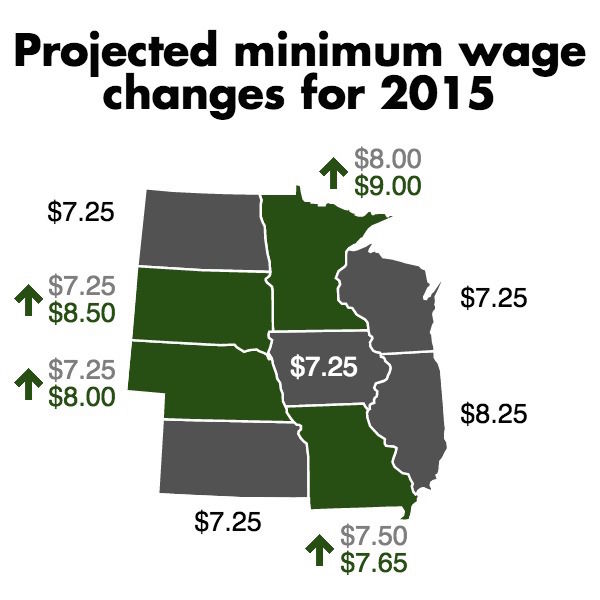Editorial: Minimum wage increase is bad for economy

Out of the all the states in the Midwest projected to see an increase in the federal minimum wage, Iowa is not one of them. The states who are projected to see an increase, however, will see changes take effect in January 2015.
December 5, 2014
Senator Harkin proposed in 2012 that the United States raises the federal minimum wage to $10.10. As college students, many of us are currently working entry level and minimum wage jobs, so an increase in the federal minimum wage sounds great on a personal level, but looking at the bigger picture, raising the minimum wage could be the wrong choice for the United States as a whole.
One reason that raising the minimum wage could be a possible downfall for the United States economy would be the job losses that would result from it, according to the CATO Institute. The first minimum wage raise of 25 cents, recorded in the United States, resulted in an increase in people being fired or laid off due to businesses’ lack of funds for more workers.
Part-time workers were being pushed out of jobs and the United States ended up in an economic downturn, according to A 2011 study by Barry Hirsch. Though the loss of jobs in the U.S. seems as though it would be reason enough not to raise the minimum wage, there are other issues that may occur.
Raising the minimum wage would actually have little effect on the poverty level in the United States. When the minimum wage was previously increased from $5.15 to $7.25, only 15 percent of people in the United States who were considered “poor,” came out of poverty from the wage increase. If the wages were to raise from $7.25 to $9.50, only 11 percent of poor people would benefit, according to a 2012 review by Mark Wilson.
Wilson’s study went on to show that since 1995, eight studies have been done about how the poverty level is changed by minimum wage and all eight studies show that the increase of the minimum wage made little to no impact on the number of people or families that fall under the national poverty line.
Raising the minimum wage is going to have an effect on everyone, not just the people that will be earning those wages. Small business owners may run into the financial issue of not being able to pay their employees, and in extreme results may even lose their businesses.
The 2012 Wilson review shows that if the minimum wage is increased by 10 percent, the prices of food will also increase by four percent.
In Chicago, the restaurants run by private owners will have to increase the prices of their dishes in order to pay their employees. America values entrepreneurship and the ability for people to be able to own small businesses, but if the minimum wage continues to increase, some of these business people will not be able to compete with larger corporations and may go out of business, according to a 2007 study from the Federal Reserve Bank of Chicago.
The minimum wage was not created for people to work at these wages forever. They are set as entry levels and over time, people are supposed to receive pay raises to get out of the entry level jobs and move up through the businesses. While people who are working minimum wage jobs find it easy to say yes to raising the federal minimum wage to $10.10, in all reality, this could be a detrimental move for our nations economy.






